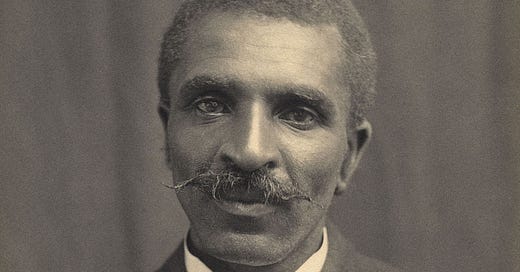"When you do the common things in life in an uncommon way, you will command the attention of the world." - George Washington Carver
George Washington Carver had a difficult start in life. Born around 1864, he was the child of Mary and Giles, an enslaved couple owned by Moses and Susan Carver. Giles died shortly before George's birth, likely from an accident while hauling wood. Then, only weeks after birth, slave traders kidnapped George, his sister, and their mother. Rescued would not be an apt term; recovered is more appropriate. The group sent out to find George and his mother exchanged a "very fine race horse" for the young boy. His mother and sister, however, were lost to the traders. Less than two months old, and George was already an orphan.
With Mary gone, Moses and Susan decided to raise George and his brother, James. The Carvers treated George and James kindly, raising them as their own children. In his autobiography, George wrote, "Mr. and Mrs. Carver were very kind to me...They encouraged me to secure knowledge, helping me all they could."
Growing up, George was a frail child, frequently falling ill. He was not expected to live long. But live he did, and from a young age showed much devotion to work and a desire for learning. He was curious, and as he'd roam the woods near the Carver home, exploring flowers, trees, rocks, and birds, he began asking questions about their purpose. "I literally lived in the woods. I wanted to know the name of every stone and flower and insect and bird and beast. I wanted to know where it got its color, where it got its life," he would say. This keen interest earned him the nickname "the plant doctor," as people in the community began turning to George for help with their ailing plants.
Along with his wildlife education, George learned informally at home as well. And although the Carvers encouraged his educational pursuits, the racial prejudices of the time meant there were no schools for black children in his area. But George desired to go to school. At ten years old, he learned of one about eight miles from the Carver home.
Without any money or a new home, he left the Carver's to attend this school, living in an old barn while doing jobs, including cooking for wealthy families to earn money and lodging to survive. During these years, George also learned to do laundry, a skill he would often turn to to pay for his livelihood in the upcoming years. What he never did, however, was take money without working for it. "I would never allow anyone to give me money no difference how badly I needed it," he would say.
Keep reading with a 7-day free trial
Subscribe to Historical Snapshots to keep reading this post and get 7 days of free access to the full post archives.




